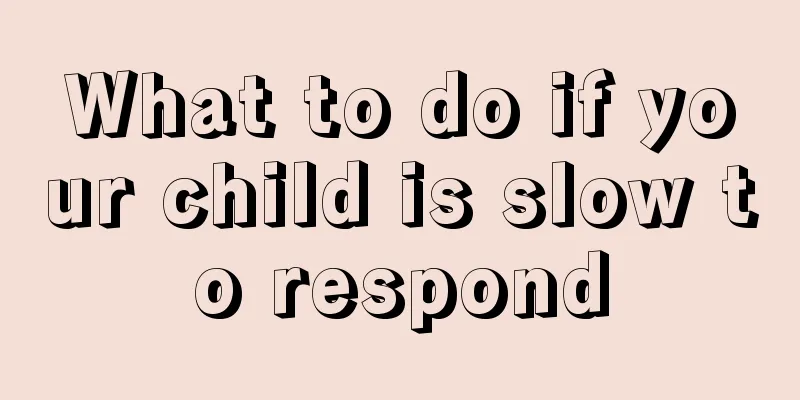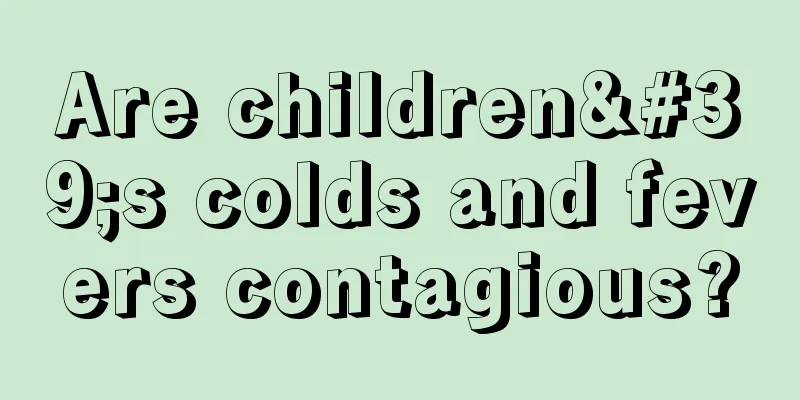What to do if your child is slow to respond

|
In life, we often hear many parents say that their children are slow to react. If the baby is severely slow to react, it does not rule out the possibility that it is related to symptoms of mental retardation. Children with mental retardation may exhibit abnormal crying, sleep disorders, and even incoordination and dull expressions due to certain stimuli. Symptoms of intellectual disability in children 1. Abnormal crying: If the baby cannot react immediately when subjected to external stimuli, but takes a long time to cry, or needs many stimulations before crying, it is a sign of developmental delay. And if the baby's cry is high-pitched and weak, it is abnormal. Some babies don’t like to cry, but being too quiet is also an abnormal state. 2. Poor sucking ability: The baby's sucking ability is reflected in the chewing ability and swallowing ability. If your baby learns how to chew food very late, has difficulty swallowing solid objects, or even retches, it is a sign of intellectual retardation. 3. Sleep: Parents also need to pay close attention to their baby’s sleep. If your baby sleeps for a long time every day and has difficulty waking up no matter how you call him, he may have intellectual disabilities. 4. Incoordination of movements: If the baby’s limbs are still not coordinated like normal people after 100 days, then the cause of intellectual retardation needs to be considered. For example, it is difficult to straighten the head, it is difficult to turn the head, and the eyes keep turning inward or outward. 5. Dull expression: Usually, babies with intellectual disabilities will not smile until they are over 100 days old, and their faces have no expression and look very dull. Moreover, they cannot smile naturally even when they are six months old. 6. Playing with hands: If the baby is still staring at or playing with fingers after six months, you should consider the possibility of intellectual retardation. 7. Slow reaction: Slow reaction means that babies over six months old still have difficulty concentrating, cannot observe objects moving in front of them, have difficulty facing the place where sounds are made, and even have difficulty turning over and sitting up without help from others. 8. Drooling: If your baby still drools frequently and grinds his teeth after waking up when he is seven to nine months old, it is a sign of intellectual retardation. 9. Unable to pick up things: If a nine-month-old baby still has not learned to use his hands to pick up things and has difficulty standing on his own even with the help of his parents, you should consider the possibility of intellectual retardation. |
<<: How to educate a child who hits others
>>: The easiest way to treat a child's stuffy nose
Recommend
What causes bleeding in newborn baby’s poop?
Many parents will have this question: why does ou...
What is the reason why babies walk with their feet turned inward?
Nowadays, every family with a baby treasures the ...
What should I do if my newborn baby has bloodshot eyes?
Having bloodshot eyes is a very common phenomenon...
What to do if a child has a fever
What to do when a child has a fever? This is a pr...
What to do if your six-month-old baby is restless while sleeping
Every baby lives in a different environment, so s...
What to do if a three-month-old child has a fever
A child’s immune system is the weakest when he or...
What is the daily diet plan for an eight-month-old baby?
Nowadays, parents are very careful in taking care...
What are the antiviral drugs for babies?
A large part of the reason why babies get sick is...
Why do children sleep on their backs?
In our popular concept, sleeping should be done w...
What should parents do if their children are depressed?
In today's society, many people have become &...
What should children eat for acute gastritis?
Modern people are very prone to gastrointestinal ...
Can babies eat black fungus?
Wood ear vegetable is actually a commonly consume...
What should I do if my child has mouth eczema?
It is actually very common for children to have e...
Children's family education is very important
There are many kinds of education that children r...
What to do if the baby's eye tail is red
Because babies have tender skin and low immunity,...









